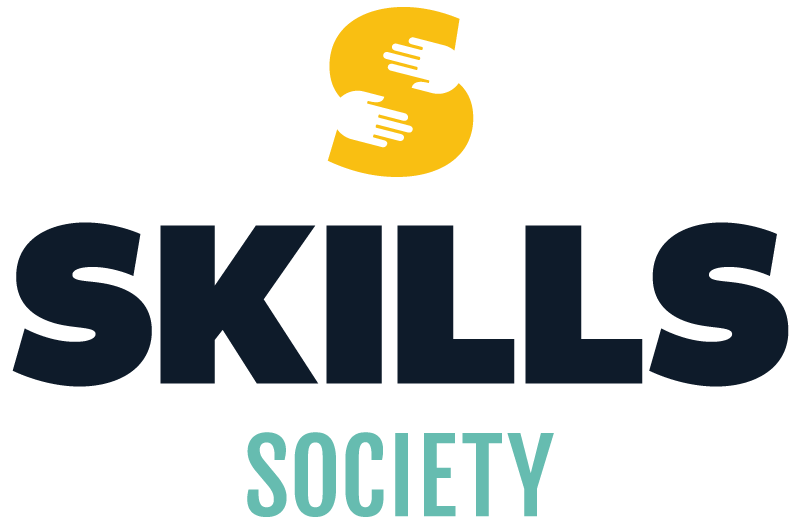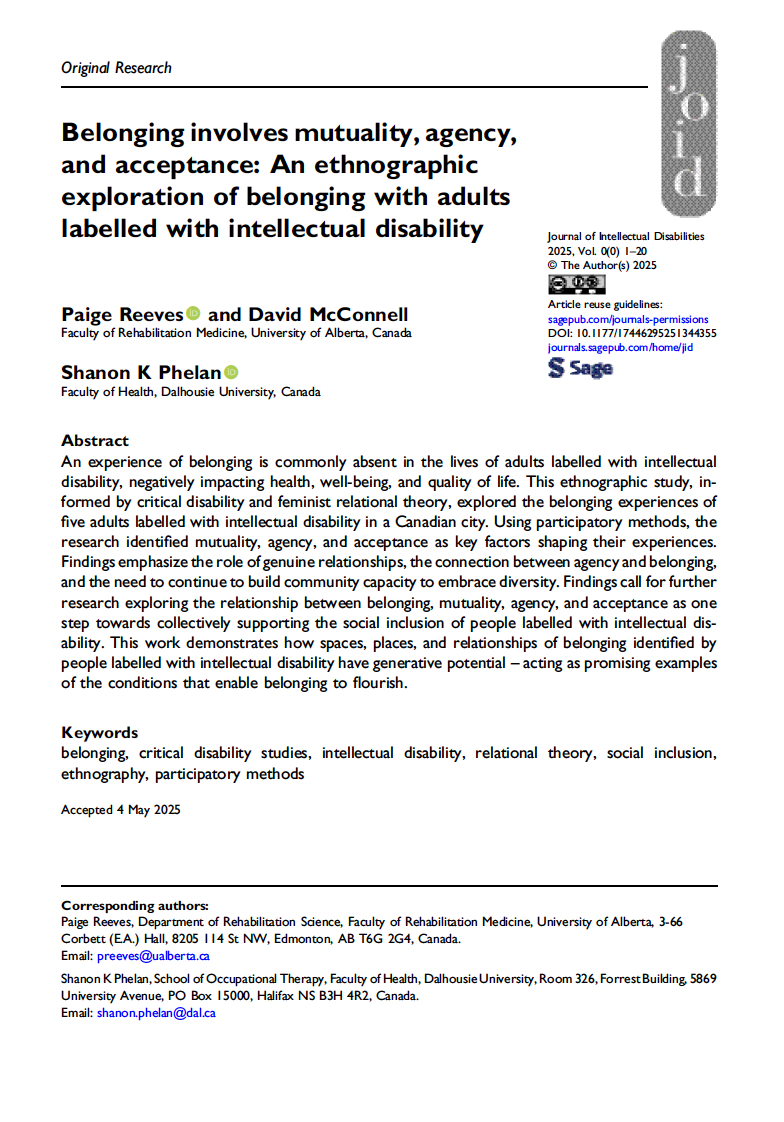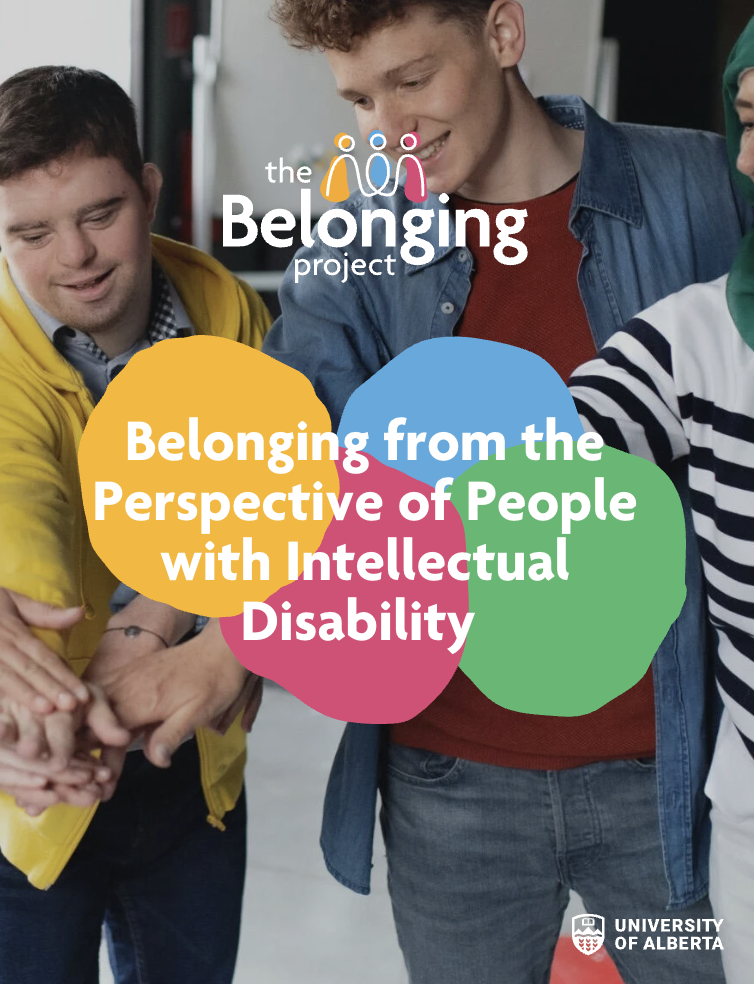The Belonging Project
A Research Partnership between Skills Society and the University of Alberta
Exploring the conditions, actions, and processes that support belonging in the lives of people with intellectual disabilities
Why a Project about Belonging?
A hope of Skills Society is that all people, including people with intellectual disabilities, feel like they belong. Some actions have already been taken to help make sure people with intellectual disabilities are included such as Canada adopting the United Nations Convention on the Rights of Persons with Disabilities and the closing of large scale institutions in Alberta. However, these kinds of actions are not always enough on their own. Even though most people with intellectual disabilities now live in the community and generally enjoy the same rights and freedoms as everyone else, they often do not feel a strong sense of belonging. There also needs to continue to be shifts in the ways people think about, talk about, and relate to people with disabilities in order for people to feel like they belong. The goal of the Belonging Project was to learn more about how belonging shows up in the lives of people with intellectual disabilities and the conditions, processes, and actions that help them feel like they belong.
What We Did
Five people with intellectual disabilities decided they wanted to participate in this project. Each of these people talked to the researchers in an interview, shared stories from their life, gave a tour of their home, and chose up to four spaces or relationships of belonging they wanted to explore further in a go-along interview. Participants took the researchers to all kinds of places including a community kitchen, places they volunteered and worked, a bowling alley, and coffee shops. Participants also introduced the researchers to their partners, friends, support workers, and family members. Researchers also interviewed nine policy, advocacy, and service provider leaders. Researchers recorded what was shared and used the information to write the articles and reports below. The researchers recognized the ways research has sometimes been used to harm people with disabilities in the past. The researchers were careful in the design of the project to make the process as inclusive, welcoming, and safe as possible. The researchers are also doing their best to make sure what was learned from the project is made accessible to different people including the participants, other people with disabilities and their allies, service providers, and other researchers.
Creative Workshop
As part of the exploration, project participants and their friends gathered in the Action Lab to collaboratively create symbols of their friendship. The workshop was lead by Jared Quinney, an artist from the Nina Haggerty Centre for the Arts. Participants used lino to stamp images onto paper. They then described their creations to the larger group. These descriptions were used to caption each piece. Participants got to take their framed art pieces home.
Linocut print supplies used during the creative workshop
Room set up for the creative workshop
Articles & Reports
Academic articles and plain language summaries that have been created directly out of this project.
The Radical Role of Belonging in Shifting & Expanding Understandings of Social Inclusion
Academic Article
*A pre-print version is available for download below. For the final published version, contact preeves@ualberta.ca
Belonging and Inclusion: How are they the Same and Different?
Simple Summary Slide Deck
[Best for Digital Viewing]
Belonging and Inclusion: How are they the Same and Different?
Simple Summary Report
[Best for Printing and Reading]
Belonging Involves Mutuality, Agency, and Acceptance: A Participatory Ethnographic Exploration of Belonging with Five Adults Labelled with Intellectual Disability
Academic Article
Belonging from the Perspective of People with Intellectual Disability
Simple Summary Slide Deck
[Best for Digital Viewing]
Belonging From the Perspective of People with Intellectual Disability
Simple Summary Report
[Best for Printing and Reading]
“We’re not really into helping, we’re into being useful”: Service Provider Practices that Support Belonging
Academic Article
Service Provider Practices that Support Belonging
Simple Summary Slide Deck
[Best for Digital Viewing]
Service Provider Practices that Support Belonging
Simple Summary Report
[Best for Printing and Reading]
Related reports that have been written by leaders of this project.
The Role of Belonging in Deepening the Community Living Movement
A think piece in the 2025 Skills Society Annual Report
Actioning, Innovating, and Dreaming About Belonging
A think piece in the 2023 Skills Society Annual Report
Reflections on the ‘Good Life’
A think piece in the 2022 Skills Society Annual Report
Deepening our Capacity to Support Belonging
A think piece in the 2019 Skills Society Annual Report
What’s Next?
Leaders from this project continue to work on creating tangible tools and resources that will help the disability services sector and help support the knowledge that was generated in being used in meaningful ways.
The Belonging Toolkit
The Belonging Toolkit is an interactive, reflection based training experience designed for frontline support workers. The toolkit is in its early stages of development but we hope to secure funding and work with people with intellectual disabilities and frontline support workers to bring the concept to life over the course of this next year. Interested in being part of development? Have a lead on funding? Thoughts on others ways you might support? Contact Paige Reeves at paiger@skillssociety.ca.
The Big Idea in a Nutshell
Similar to a subscription box, a support worker would receive a series of small packages spaced 4 weeks apart. The packages would be designed to be delightful - incorporating a note that orients the worker to the importance of their role, a small gift (e.g. cool stickers, a print created by someone with an intellectual disability), and an interactive activity and reflection for them to complete. Participants could have ‘critical companions’ they connect with to ask questions, explore ideas, and debrief with after each activity (e.g. a manager or peer). A hope is that the toolkit can be designed to allow support workers to complete it during down time in their regularly scheduled shifts with debriefs happening as part of their regular team meetings.
The Problem(s) it is Trying to Solve
Supporting belonging in the lives of people with intellectual disabilities is complex work that is hard to do and few have figured out how to do it really well in a large scale way.
Frontline support workers do not have much opportunity to think about and explore how they can support belonging (deep and meaningful connections with others) in their role
Supporting belonging well requires opportunities to think critically and reflexively about disability and inclusion
Bringing people together for one off training is expensive and not always the most impactful way to support learning
Some Example Explorations the Toolkit Might Include
Reflecting on what belonging means (integration vs inclusion vs belonging)
Thinking differently about disability (medical vs social or rights models)
Exploring the support worker role (about more than safety and custodial care)
Generating ideas for people and places where someone might want to belong (getting creative and breaking out of status quo, not settling for good enough)
Noticing and navigating norms (putting on a detective hat to understand what might hinder someone’s belonging in a space)
Fostering connections between people (tangible strategies)
Identifying and creating meaningful roles (tangible strategies)
Thank You to Our Funders
This project was funded by a Social Sciences and Humanities Research Council (SSHRC) Doctoral Fellowship as well as the Research at the Intersections of Gender Initiative and the Faculty of Rehabilitation Medicine at the University of Alberta.
Impact
The experiences and knowledge of Skills Society community members including the people we serve, their families and allies, and staff helped shape the creation of new knowledge and insights about belonging and how to support it
The work has been presented at multiple local, national, and international conferences including TASH, the Nordic Network of Disability Research, Alberta Council of Disability Services, and the Canadian Association of Occupational Therapists Conference
Three journal articles have been published in internationally recognized journals
This project is an example of how to conduct research with people with intellectual disabilities in inclusive and safe ways
Findings from this work have and continue to inform Skills Society’s own practices and innovation projects
Leadership
Community
Members
We extend our gratitude to all who participated in this project. Your courage and willingness to share your experiences made this project possible.
Paige
Reeves
This work was completed as part of Paige’s PhD, in the Faculty of Rehabilitation Medicine, University of Alberta. Paige is also Director of Research and Social Innovation at Skills Society
Shanon
Phelan
Associate Professor, School of Occupational Therapy, Dalhousie University and Director of SHIFT Collective
David
McConnell
Professor, Faculty of Rehabilitation Medicine - Occupational Therapy, University of Alberta and Director of Family and Disability Research Collaborative
Rebecca
Rubuliak
Director of Continuous Improvement and Innovation, Skills Society





















